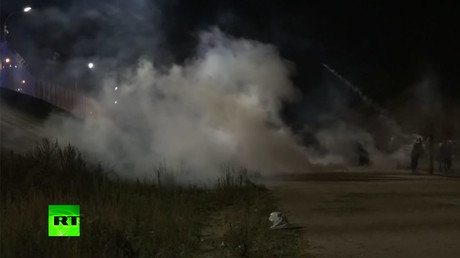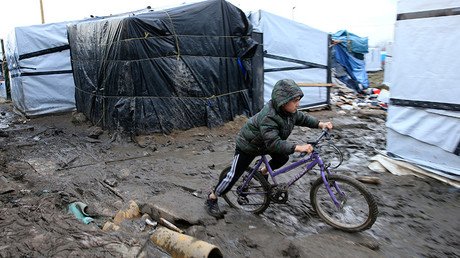Where violence became norm: ‘Jungle’ camp clear-up kicks off in Calais (VIDEO)
An operation to raze the infamous ‘Jungle’ camp has kicked off in Calais, northern France, where violence broke out between armed police and migrants protesting against government plans to dismantle the home of up to 10,000 and relocate the inhabitants.
“Violence has become the norm here, with some of the migrants throwing projectiles, stones and bottles at police, which responded with tear gas,” RT's Harry Fear reported from Calais.
Police separating people in line into smaller groups after tensions rose. #Calais@dwnewspic.twitter.com/rRWxKG9PuS
— Doris Pundy (@DorisPundy) October 24, 2016
“There's a risk tensions increase in the week because at some point the bulldozers are going to have to come in,” Fabrice Durieux from the charity Salam told Reuters.
On Monday, thousands of migrants – primarily from the Middle East and North Africa – separated into families, adults, unaccompanied minors and vulnerable individuals, were queuing up to be bussed to reception centers where those who haven’t yet applied for asylum will be able to do so.
“There’s a large number of those in the camp who don’t want to go to refugee centers. Some research from refugee groups suggests that one third want to stay in Calais,” RT’s correspondent reported.
Some say that refugees, determined to reach the UK at any cost, would simply hide nearby for a while to regroup in Calais at a later point, when things calm down.
“Each time they dismantle part of the camp it's the same thing,” Christian Salome, president of non-profit group Auberge des Migrants, said. “You're going to see them go into hiding and then come back. The battles will continue.”
"I'm not sad to be leaving but we do not know where they will take us," a young refugee from Darfur says on leaving #Jungle#Calaispic.twitter.com/WvJ2L8gSrm
— Stefan Simanowitz (@StefSimanowitz) October 24, 2016
Migrants register at a processing centre in the jungle near Calais, northern France https://t.co/Vo9UFDNSz0 📸: John Stillwell pic.twitter.com/dCMFfsKKsw
— PA Images (@PAImages) October 24, 2016
Thousands of French nationals have been up in arms over President Francois Hollande’s plan to relocate immigrants in as many as 450 centers across the country.
“We intend to dismantle Calais entirely, and relocate people throughout France with small centers for 40-60 people staying for a limited period of three to four months. This will happen in full coordination with the migrants,” Hollande said in late September.
The far-right National Front party says the government plan would create mini-Calais camps across France, however.
Locals have also been voicing outrage over the decision to build refugee shelters in their towns.
“The problem is not to distribute migrants across the country, the problem is that French people don’t want them anymore,” a resident of Louveciennes in the Île-de-France region told RT. “The French don’t want immigration. This is the reality,” he added.
“What will migrants do here? They don’t learn French; we don’t teach them the values of the Republic. Even on the health side. We’re not able to treat them correctly,” a woman from Yvelines in northern France told RT.
Many people in France are opposed to relocating the refugees and migrants throughout the country, French municipal councilor Patricia Chagnon told RT. “France has about eight million poor people who are in desperate need of government aid and we have three million people waiting for a decent place to live in France. So they think why can [the government] find room, all of a sudden, for these migrants when they cannot even look after their own people,” she said.
It’s not just the decision to redistribute the refugees that has the French at loggerheads with their government, but also how it is being carried out, the municipal councilor said. The socialist government “have not consulted at all with the local population; they had not talked at all with the local politicians to see how and under what conditions it would be possible to organize this. They have simply imposed these migrants all over France. And we don’t even know where.”
READ MORE: Coming soon to a quaint French village near you: Calais ‘Jungle’ refugees
Experts say there’s also an important “political aspect” behind the human side of the migrant problem.
“The human side is of course the problem of migrants, losing their homes, etc. The project of the mainstream political parties is to transform the French into a multicultural society. And France is not a multicultural society,” Claude Rochet, Professor at the Institute of Public Management, Aix-Marseille University, told RT.
The British and French governments are in hot waters over relocating the refugees from the Jungle camp in Calais, Sanwar Ali, editor at workpermit.com, told RT on Friday, adding that the UK could have done more to deal with its responsibilities.
The eviction note in 9 languages being handed out to migrants in Calais Jungle camp, telling them they must leave to claim asylum #cbcpic.twitter.com/7O8kSJcIWg
— Thomas Daigle (@thomasdaigle) October 24, 2016
#refugees have been queueing for hours in #Calais with very little information about the process or where they will be relocated to. pic.twitter.com/rWfayy3XfD
— Doctors of the World (@DOTW_UK) October 24, 2016
“France is resettling many refugees. The reason why they are closing down the camp in Calais is because they have had some success of resettling refugees. The UK also has great responsibilities, and the UK is doing many things to try and deal with the responsibilities. However, I think many people have also criticized the UK for not doing enough. So perhaps more can be done,” he added.
The Jungle houses between 5,000 and 10,000 asylum seekers, according to estimates from different human right groups working on the site. There are currently some 1,000 unaccompanied children in the camp, the British Red Cross said in its report.
According to the Red Cross, the UK has been refusing to take in unaccompanied refugee minors stranded in the Jungle, preventing them from being reunited with families there. The group blamed UK Home Office bureaucracy for causing unaccompanied children to be stranded and in danger of losing all protection and shelter once the camp is finally dismantled.
On the first day of the dismantling of the camp, the UK Home Office has not been allowed to register children, the Guardian reported, citing the Help Refugees charity. As a result, "the most vulnerable group, the under 13's" will have to remain at least for a night in the Calais Jungle "amidst all the confusion and chaos," the charity said, adding that according to its latest census there are 49 unaccompanied children in the age group there, the youngest of whom is eight years old.
Earlier this month, Labour MPs pressed UK Home Secretary Amber Rudd to clarify how many of the 1,000 unaccompanied children in Calais the UK would take, but Rudd refused to provide an exact figure. She told the Daily Mail that if 300 child refugees came to the UK it would be “a really good result.”
Charities estimate some 387 children are entitled to move to the UK, roughly half of whom have family members already in the country.
The 1,291 unaccompanied kids in the #Calais Jungle will stay there until decisions are made about their future. pic.twitter.com/OMtZMLxfFO
— MSF Sea (@MSF_Sea) October 24, 2016
Officials tell us that 150 unaccompanied kids admitted to the containers since noon, up to 300 by day's end. #Calaispic.twitter.com/x5NsGuAoYj
— Michael Bochenek (@MichaelBochenek) October 24, 2016














